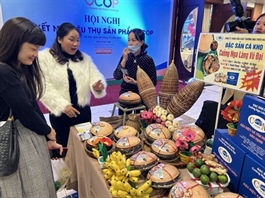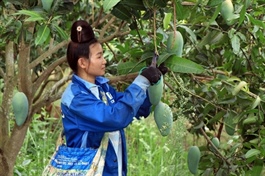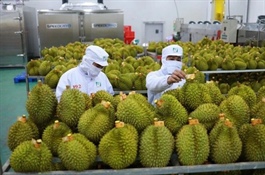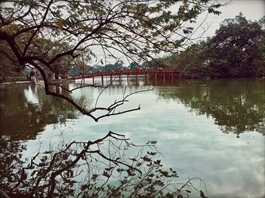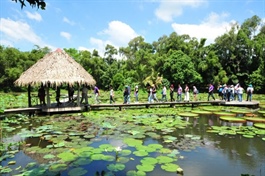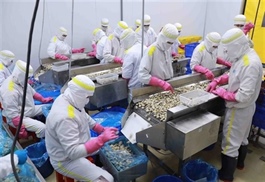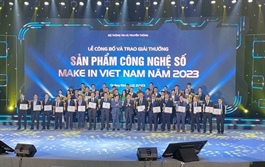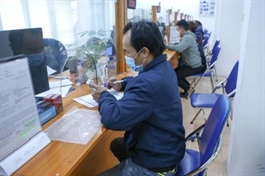Lack of criteria holding back green strategy
Lack of criteria holding back green strategy
The unclear understanding of how to attract green investment is causing trouble for both green manufacturers and those in more traditional sectors.

At last week’s conference on green investment in Hanoi, Le Anh, director of sustainable development at DuyTan Plastic Recycling Company, said that while its factory ensures zero waste and zero emissions, it has found it tough to win over some areas with its services.
“While recycling is an issue that is being widely promoted in government policy, some localities have not welcomed us, and even outright refused to work with us,” Le Anh said, explaining that the company’s business lines are related to plastic and waste.
Despite this, the company has just been recognised as a high-tech recycling company by the Ministry of Science and Technology, and has gained some ground.
“In Vietnam, we have partnered with and supplied big brands to demonstrate our product quality and reputation. We hope to have better companionship and support from relevant agencies and local governments,” Anh added.
In addition to DuyTan, the conference heard that other businesses have also claimed that they are struggling with investment procedures in Vietnam because some local leaders do not approve ventures if the industries the businesses want to get involved in are already known to cause too much pollution.
“If this happens in many localities, we should clearly draw up a list of industries that are not encouraged for investment in law. This is also a useful reference for industrial zone (IZ) developers to set targets and attract investors alongside green growth and sustainable development,” said Nguyen Thi Thao Nhi, chairwoman of IZ developer Thanh Binh Phu My JSC.
In the context of fierce competition in attracting investment among countries today, without consensus, a specific set of criteria, and transparency in information, some large projects in important industries for national development will be missed because of the caution rising and the pressure of green growth, she added.
Nhi proposed that state agencies must redefine green development because not all the basic material and chemical producers are polluting industries. Many of the world’s large battery manufacturers for electric cars exploit and use ore as input materials. However, they have spent a huge amount of money on high technologies with strict processes, without any emissions.
“When registering investment, they have to submit for in-principle approval along with numerous documents, these barriers are mitigating the national competitiveness in wooing foreign investment,” Nhi claimed.
In some cases, some traditional industries will have no locations for production and manufacturing. Hua Quoc Hung, head of the Management Board Management of Ho Chi Minh City Export Processing and IZ Authority, said, “We should not filter industry but choose technology that can reduce emissions, and raise investment efficiency. All industries making products that meet the needs of society, like clothing, and even polluting ones such as construction materials production and chemicals – where are locations for them?”
Some industries cannot be located in residential communities, and if IZs and export processing zones do not accept them, these factories have nowhere to go, Hung added.
“We should not care about which industry to choose, labour-intensive or environmentally polluting ones, because technology and the market will regulate and adjust the development and requirements of these industries,” Hung stated.
Decree No.35/2022/ND-CP on prescribing the management of IZs and economic zones stipulates that 60 per cent of areas are for specialised industries, and the rest for other industries. “Ho Chi Minh City has a project to convert IZs in which there will be some small areas for non-prioritised industries. So manufacturers must update technologies and production lines to have access to more locations,” Hung recommended.
At last week’s conference, Kasahara Masayuki, chief representative of the Japan International Cooperation Agency (JICA) in Ho Chi Minh City, shared lessons in Japan’s Kitakyushu city, which faced pollution problems from industrial production and manufacture but successfully transformed into an eco-city.
JICA also helped to transform successfully a similar zone in Thailand, and is supporting the southern province of Ba Ria-Vung Tau to enable Phu My 3 Specialised Industrial Park project to become a model for replication in other locations.
“We should highlight economic benefits in the transition to green growth. Economic benefits must be ensured based on less use of resources and reduced impact on the environment,” Masayuki said. “The transition needs to be based on the existing situation and improve it in an environmentally friendly way. To do so, it is necessary to have appropriate action programmes from both a direct and indirect perspective.”







